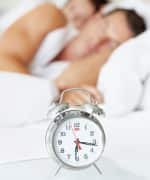Life Extension Magazine®
Lack of sleep doesn’t just make you feel exhausted all the time. It’s dangerous.
Insufficient sleep is linked to increased risk of diabetes, high blood pressure, heart attacks, cancer, accelerated aging, and premature death.1,2
Many people resort to prescription drugs,3 putting them at risk of side effects and dependence.
More than 8% of older Americans resort to sleep medications—even though national guidelines warn against the use of prescription sleep medicine by people over 65.3,4
There is an alternative.
In a clinical study, an extract of the herb ashwagandha resulted in an average 72% increase in restorative sleep within six weeks.5
Working in a complementary way, melatonin, when properly dosed, has been shown to help some peoplefall asleep faster and stay asleep throughout the night.6,7
Taking these two ingredients together can help ensure a night of longer, better sleep.
Health Risks of Inadequate Sleep
The Centers for Disease Control and Prevention (CDC) and others recommend that adults get seven or more hours of sleep a night.8,9
More than one in three adults get suboptimal sleep on a regular basis.1 Studies show that frequently getting too little sleep may increase the risk of:10-13
- Obesity,
- Depression,
- Dementia,
- Heart disease,
- Type II diabetes,
- Some cancers, and
- Other chronic health issues.
For every one-hour reduction in sleep per night, there is about a 6% increase in the risk of death from any cause.2
Sleep problems worsen with age.14 Changes in hormones as we grow older have been linked to insomnia and poor sleep quality.15-17 Some medications prescribed to older adults can also disrupt sleep.18
About nine million people in the U.S. rely on sleep medications.19 But they come with side effects like memory problems and dizziness, potential for physical dependence, a “hangover effect” that leads to poor mental performance the day after use, and other risks.20-24
Both the U.S. Food and Drug Administration (FDA) and drug manufacturers themselves advise that these medications are for short-term use only. It should also be noted that the risks of sleep medications are greater for older adults.4
Balancing and Regulating Sleep Patterns
Scientists have been investigating safer ways to help people fall asleep more quickly and improve their sleep quality.
Two hormones that regulate and balance the cycles of wakefulness and sleep are cortisol and melatonin.
Cortisol is one of the body’s stress hormones, and is intimately involved in the body’s fight or flight response. It also helps to control the wake-sleep cycle.
Normally, cortisol levels rise as we approach the end of our sleep cycle, reaching their highest point around 9 AM to enhance wakefulness. Then, to pave the way for sleep, cortisol levels decline during the day, bottoming out around midnight.25
In a world of chronic stress, this cortisol rhythm is often thrown out of balance and can interfere with sleep. Poor sleep can result in even higher cortisol levels, setting up a vicious circle.25
Melatonin is known as the sleep hormone. It activates receptors in the brain that regulate sleep and the body’s circadian (daily) rhythm.26
Melatonin production declines with age, contributing to some of the sleep problems seen with advanced age.27,28
Cortisol and melatonin both work to regulate sleep and wakefulness.
Scientists have identified ashwagandha and melatonin as two ingredients that can regulate and balance hormones to promote more restful sleep.
Ashwagandha Promotes Calm
Ashwagandha is an herb that has been used in traditional Indian medicine for thousands of years.29 Extracts of its roots and leaves contain a mix of beneficial compounds, including withanolide glycosides.30
Ashwagandha root powder has been shown to lower cortisol levels. It also reduces the anxiety and stress that increase cortisol production.31
Researchers have documented these anxiety-reducing properties.29,32
In one study of adults with self-reported high stress, an extract of ashwagandha (standardized to 35% withanolide glycosides) led to a significant reduction in scores on stress-assessment scales. The use of this extract was also associated with reduced levels of cortisol in the morning.33
Another way that ashwagandha reduces stress is by activating nerve-cell receptors for a calming neurotransmitter called GABA.34
What you need to know
Fall Asleep Faster, Stay Asleep Longer
- Lack of sleep is a serious health threat, increasing the risk of many chronic illnesses and premature death.
- About nine million Americans take prescription drugs to get to sleep. They come with potentially dangerous side effects and can lead to dependency.
- An extract of the herb ashwagandha standardized to 35% withanolide glycosides helps lower anxiety and stress and reduces levels of the stress hormone cortisol. In a clinical trial, it led to a 72% increase in restorative sleep.
- Maintaining higher nighttime levels of the “sleep hormone” melatonin promotes faster sleep onset and higher-quality sleep. Combining immediate-release and extended-release forms can allow people to stay asleep all night.
- A blend of ashwagandha and melatonin can rebalance nighttime cortisol and melatonin levels, providing a longer, more restorative sleep.
Clinically Validated Results
To validate ashwagandha’s effects on sleep, scientists tested a standardized 35% withanolide glycoside extract.
Every evening for six weeks, 75 volunteers were given a placebo and 75 were given 120 mg of ashwagandha extract.
Those in the ashwagandha group had significantly improved quality of sleep, including a:5
- 72% increase in restorative sleep, measured by a standard, weekly sleep questionnaire,
- Significant improvement in sleep efficiency (total sleeping time as a percentage of total time spent in bed),
- 27% decrease in sleep onset latency (time needed to fall asleep), and
- 15% decrease in wake after sleep onset (time spent awake after first falling asleep).
No adverse effects related to ashwagandha were reported.
Maintaining All-Night Melatonin Levels
Melatonin is produced by the pineal gland in response to darkness, and it helps control the body’s sleep-wake cycles.35
Levels of melatonin fall with age. This can result in impaired sleep and contributes to some of the consequences of disordered sleep, such as accelerated cognitive decline, cardiovascular disease, and metabolic disorders.27
Many of these effects are believed to be related to melatonin’s impact on specific brain cells and regions of the brain involved in controlling our day-night cycles.27,36
Chronic conditions, such as elevated blood sugar, can also suppress normal melatonin production, which may account for poor sleep among diabetics.37
Boosting melatonin has been shown to help normalize sleep-wake patterns and enhance high-quality sleep.38,39
Human studies have shown that raising melatonin levels via supplementation can improve sleep patterns, quality, and duration.6,7
Increasing melatonin levels results in significant improvements in:6,7,40
- Sleep efficiency (total sleeping time as a percentage of total time spent in bed),
- Sleep onset latency (time needed to fall asleep), and
- Awake after sleep onset (time spent awake after first falling asleep).
Maintaining Melatonin All Night Long
Many people take melatonin before bedtime.
Researchers have now developed a way to maintain melatonin levels all night long to enable a longer and more restorative sleep.
Scientists developed a dual-action form of melatonin containing:
- 0.5 mg of immediate-release melatonin, and
- 1.0 mg of extended-release melatonin.
This melatonin combination allows an initial elevation in melatonin levels and then delivers melatonin throughout a period of approximately seven hours.
The immediate-release melatonin can help people get to sleep faster and experience more restful and regenerative sleep. The extended-release melatonin can support a full night of uninterrupted sleep.
A placebo-controlled study of elderly subjects who complained of insomnia confirmed that taking an extended-release form of melatonin improved sleep quality.6
Taking this dual-action melatonin along with an extract of ashwagandha standardized to 35% withanolide glycosides in the evening can support a longer, more restorative sleep that promotes overall health.
Summary
Sleep problems often worsen with age.
Ashwagandha helps reduce elevated cortisol levels that can impair sleep and has been shown in a clinical trial to result in an average 72% increase in restorative sleep.
Melatonin helps reset the body’s sleep-wake cycles and promotes more effective, restful sleep. A dual-action formulation that combines immediate-release and extended-release melatonin can help people get to sleep faster and stay asleep throughout the night.
Taking ashwagandha extract standardized to 35% withanolide glycosides and dual-action melatonin 30 to 60 minutes before bedtime promotes the hormonal balance that allows more restorative, more refreshing sleep.
If you have any questions on the scientific content of this article, please call a Life Extension Wellness Specialist at 1-866-864-3027.
References
- Available at: https://www.cdc.gov/sleep/data_statistics.html. Accessed October 28, 2021.
- Yin J, Jin X, Shan Z, et al. Relationship of Sleep Duration With All-Cause Mortality and Cardiovascular Events: A Systematic Review and Dose-Response Meta-Analysis of Prospective Cohort Studies. J Am Heart Assoc. 2017 Sep 9;6(9):e005947.
- Available at: https://www.cdc.gov/mmwr/volumes/68/wr/pdfs/mm6849a5-H.pdf. Accessed October 28, 2021.
- Available at: https://ihpi.umich.edu/news/1-3-older-adults-take-something-help-them-sleep-–-many-aren’t-talking-their-doctors. Accessed October 28, 2021.
- Deshpande A, Irani N, Balkrishnan R, et al. A randomized, double blind, placebo controlled study to evaluate the effects of ashwagandha (Withania somnifera) extract on sleep quality in healthy adults. Sleep Med. 2020 Aug;72:28-36.
- Garfinkel D, Laudon M, Nof D, et al. Improvement of sleep quality in elderly people by controlled-release melatonin. Lancet. 1995 Aug 26;346(8974):541-4.
- Brzezinski A, Vangel MG, Wurtman RJ, et al. Effects of exogenous melatonin on sleep: a meta-analysis. Sleep Med Rev. 2005 Feb;9(1):41-50.
- Watson NF, Badr MS, Belenky G, et al. Recommended Amount of Sleep for a Healthy Adult: A Joint Consensus Statement of the American Academy of Sleep Medicine and Sleep Research Society. Sleep. 2015 Jun 1;38(6):843-4.
- Available at: https://www.cdc.gov/sleep/features/getting-enough-sleep.html. Accessed October 28, 2021.
- Riemann D, Krone LB, Wulff K, et al. Sleep, insomnia, and depression. Neuropsychopharmacology. 2020 Jan;45(1):74-89.
- von Ruesten A, Weikert C, Fietze I, et al. Association of sleep duration with chronic diseases in the European Prospective Investigation into Cancer and Nutrition (EPIC)-Potsdam study. PLoS One. 2012;7(1):e30972.
- Cooper CB, Neufeld EV, Dolezal BA, et al. Sleep deprivation and obesity in adults: a brief narrative review. BMJ Open Sport Exerc Med. 2018;4(1):e000392.
- Lao XQ, Liu X, Deng HB, et al. Sleep Quality, Sleep Duration, and the Risk of Coronary Heart Disease: A Prospective Cohort Study With 60,586 Adults. J Clin Sleep Med. 2018 Jan 15;14(1):109-17.
- Zhang F, Zhong R, Li S, et al. The missing link between sleep disorders and age-related dementia: recent evidence and plausible mechanisms. J Neural Transm (Vienna). 2017 May;124(5):559-68.
- Geyer C. In Search of a Good Night’s Sleep: Hormones, Mind, Movement, and Breath. Am J Lifestyle Med. 2018 Mar-Apr;12(2):120-3.
- Hardeland R. Aging, Melatonin, and the Pro- and Anti-Inflammatory Networks. Int J Mol Sci. 2019 Mar 11;20(5).
- Baker FC, de Zambotti M, Colrain IM, et al. Sleep problems during the menopausal transition: prevalence, impact, and management challenges. Nat Sci Sleep. 2018;10:73-95.
- Sutton EL. Insomnia. Med Clin North Am. 2014 May;98(3):565-81.
- Available at: https://www.nbcnews.com/health/womens-health/prescription-sleep-pills-not-likely-help-women-long-run-study-n1267029. Accessed October 29, 2021.
- Available at: https://www.drugs.com/article/benzodiazepines.html. Accessed October 28, 2021.
- Frey DJ, Ortega JD, Wiseman C, et al. Influence of zolpidem and sleep inertia on balance and cognition during nighttime awakening: a randomized placebo-controlled trial. J Am Geriatr Soc. 2011 Jan;59(1):73-81.
- Chung SD, Lin CC, Wang LH, et al. Zolpidem Use and the Risk of Injury: A Population-Based Follow-Up Study. PLoS One. 2013;8(6):e67459.
- Available at: https://www.sleepfoundation.org/articles/orexin-receptor-antagonists-new-class-sleeping-pill. Accessed October 28, 2021.
- Available at: https://www.mayoclinic.org/diseases-conditions/insomnia/in-depth/sleeping-pills/art-20043959. Accessed October 29, 2021.
- Hirotsu C, Tufik S, Andersen ML. Interactions between sleep, stress, and metabolism: From physiological to pathological conditions. Sleep Sci. 2015 Nov;8(3):143-52.
- Liu J, Clough SJ, Hutchinson AJ, et al. MT1 and MT2 Melatonin Receptors: A Therapeutic Perspective. Annu Rev Pharmacol Toxicol. 2016;56:361-83.
- Hardeland R. Melatonin in aging and disease -multiple consequences of reduced secretion, options and limits of treatment. Aging Dis. 2012 Apr;3(2):194-225.
- Pandi-Perumal SR, BaHammam AS, Brown GM, et al. Melatonin antioxidative defense: therapeutical implications for aging and neurodegenerative processes. Neurotox Res. 2013 Apr;23(3):267-300.
- Dar NJ, MuzamilAhmad. Neurodegenerative diseases and Withania somnifera (L.): An update. J Ethnopharmacol. 2020 Jun 28;256:112769.
- Zahiruddin S, Basist P, Parveen A, et al. Ashwagandha in brain disorders: A review of recent developments. J Ethnopharmacol. 2020 Jul 15;257:112876.
- Mahdi AA, Shukla KK, Ahmad MK, et al. Withania somnifera Improves Semen Quality in Stress-Related Male Fertility. Evid Based Complement Alternat Med. 2009 Sep 29;2011.
- Singh N, Bhalla M, de Jager P, et al. An overview on ashwagandha: a Rasayana (rejuvenator) of Ayurveda. Afr J Tradit Complement Altern Med. 2011;8(5 Suppl):208-13.
- Lopresti AL, Smith SJ, Malvi H, et al. An investigation into the stress-relieving and pharmacological actions of an ashwagandha (Withania somnifera) extract: A randomized, double-blind, placebo-controlled study. Medicine (Baltimore). 2019 Sep;98(37):e17186.
- Candelario M, Cuellar E, Reyes-Ruiz JM, et al. Direct evidence for GABAergic activity of Withania somnifera on mammalian ionotropic GABAA and GABArho receptors. J Ethnopharmacol. 2015 Aug 2;171:264-72.
- Zisapel N. New perspectives on the role of melatonin in human sleep, circadian rhythms and their regulation. Br J Pharmacol. 2018 Aug;175(16):3190-9.
- Hablitz LM, Molzof HE, Abrahamsson KE, et al. GIRK Channels Mediate the Nonphotic Effects of Exogenous Melatonin. J Neurosci. 2015 Nov 11;35(45):14957-65.
- Amaral FG, Turati AO, Barone M, et al. Melatonin synthesis impairment as a new deleterious outcome of diabetes-derived hyperglycemia. J Pineal Res. 2014 Aug;57(1):67-79.
- John TM, Brown MC, Brown GM. An oral melatonin replacement regimen that re-establishes the normal circadian levels of urinary 6-sulphatoxymelatonin in functionally pinealectomized rats. J Pineal Res. 1992 Nov;13(4):145-50.
- Altun A, Ugur-Altun B. Melatonin: therapeutic and clinical utilization. Int J Clin Pract. 2007 May;61(5):835-45.
- Fatemeh G, Sajjad M, Niloufar R, et al. Effect of melatonin supplementation on sleep quality: a systematic review and meta-analysis of randomized controlled trials. J Neurol. 2021 Jan 8.







